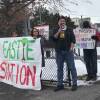A new United Nations report warns that without quick and comprehensive action, we will experience irreversible rising temperatures. That could mean more frequent and damaging heat waves, drought, wildfires and tropical storms, as well as worsening health conditions and shrinking access to food, water and housing.
Boston is not immune to these issues, especially due to the city's proximity to the ocean.
More Local News
The Rev. Mariama White-Hammond, Boston's chief of environment energy and open space, and Patrick Kinney, professor of environmental health at Boston University School of Public Health, said on Greater Boston there's great urgency to deal with climate change. They said environmental impacts such as extreme heat waves in the summer have major effects on children, the elderly and those with chronic health conditions.
"During our lifetimes it's going to get worse, but it's going to be especially challenging for our children and their children, so what we do now will really have a huge impact on their lives," Kinney said.
White-Hammond said Boston is very vulnerable to climate change. She said she and her team have mapped flood pathways to work on closing those, and use city land to rise seawalls.
"We need a full economy transformation and we needed it yesterday, but we've got to drive to it today with urgency," White-Hammond said, noting an economy driven by fossil fuels.
On an individual level, Kinney recommended using electric home heating, driving an electric vehicle or taking public transportation. He said Boston should continue its work to convert public transportation to run on electricity.
White-Hammond said there are programs in Boston that can help residents convert their homes to 100% green energy, which in some circumstances can even be a cheaper option. Those programs can be found online or by calling 311.
Watch: UN climate scientists warn of irreversible damage if we don't act fast. Here's what you can do









